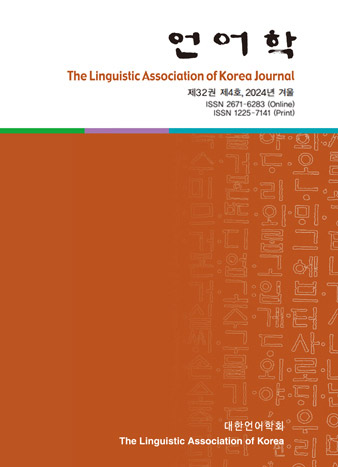대한언어학회 전자저널
32권 4호 (2024년 12월)
- Code-Switching in Korean Hip-Hop: A Corpus-Based Study of English Usage in Korean Rap Lyrics
-
Daria Soon-Young Seog
Pages : 111-129
Abstract
Seog, Daria Soon-Young. (2024). Code-switching in Korean hip-hop: A corpus- based study of English usage in Korean rap lyrics. The Linguistic Association of Korea Journal, 32(4), 111-129. This study examines code-switching between Korean and English in the lyrics of prominent Korean hip-hop artists. By analyzing a corpus of 40 songs from Jay Park, BewhY, Zion.T, G-Dragon, ZICO, Vinxen, and Okasian, it explores how these artists use English to express identity, modernity, and engage with global audiences. Code-switching is categorized into intra-sentential, inter-sentential, and tag-switching based on Poplack's (1980) classification while the cultural contexts in the frameworks of Kim (2015), Lawrence (2010), Lee (2006), and Yang (2012) provided bases for enriched analysis. Both quantitative and qualitative analyses reveal that English in Korean hip-hop serves various roles: asserting identity, enhancing international appeal, and reinforcing themes of love, power, and ambition. The statistical analyses showed high positive correlations between code-switching types among the investigated artists, highlighting English as a strategic tool for artists navigating local and global music markets. Ultimately, the findings illuminate the interplay between language, culture, and globalization in Korean hip-hop, contributing to our understanding of English's role in Korean popular culture.
Keywords
# Korean hip-hop lyrics # intra-sentential code-switching # inter-sentential code-switching # tag-switching # corpus-based study
References
- Alim, H. S. (2009). Hip-hop language: The voices of the hip-hop generation. In H. S. Alim, A. I. Morgan, & M. H. H. (Eds.), Sociolinguistics and education (pp. 177-194). Routledge.
- Androutsopoulos, J. (2009). Language and the city: Urban multilingualism in the age of globalization. In R. J. D. (Ed.), Globalization and language in the twenty-first century (pp. 21-40). Cambridge University Press.
- Cho, J. (2020). English in Korean hip-hop: Exploring the interplay of identity and language. Journal of Language and Culture, 9(1), 34-56.
- Choi, H. (2018). The sociolinguistic landscape of Korean hip-hop: A case study of identity and expression. Korean Linguistics, 8(2), 123-145.
- García, O. (2009). Bilingual education in the 21st century: A global perspective. Wiley- Blackwell.
- Gumperz, J. J. (1982). Discourse strategies. Cambridge University Press.
- Jin, D. (2007). Language, identity, and hip-hop culture in Korea. International Journal of Cultural Studies, 10(3), 305-321.
- Kim, Y. (2015). English in Korean popular music: A sociolinguistic analysis of language use and identity. Korean Language and Culture, 10(1), 56-74.
- Larsen-Freeman, D. (1975). The acquisition of English by speakers of other languages: A sociolinguistic perspective. TESOL Quarterly, 9(4), 569-579.
- Lawrence, T. (2010). Constructing global identities: English in Korean pop music. Journal of Popular Music Studies, 22(2), 123-145.
- Lee, J. (2006). The role of English in Korean pop music: A cultural perspective. Journal of Popular Music Studies, 18(2), 150-165. https://doi.org/10.1111/j.1533- 1598.2006.00134.x
- Lee, J. (2016). Hip-hop, language, and identity in South Korea: The case of Korean hip-hop artists. Journal of Language and Popular Culture, 1(1), 23-36.
- Makino, S. (1979). Language mixing and the development of bilingualism. In R. A. H. (Ed.), Bilingualism and language contact (pp. 67-85). Academic Press.
- Myers-Scotton, C. (1993). Duelling languages: Grammatical structure in code-switching. Clarendon Press.
- Park, J. (2019). The global impact of hip-hop culture: Korean hip-hop’s cosmopolitanism and identity construction. Journal of Popular Culture, 52(2), 362-379.
- Pavlenko, A. (2001). Language and culture in the context of bilingualism: A study of identity construction in the speech of bilinguals. In J. Cenoz & U. Jessner (Eds.), English in Europe: The acquisition of a second language (pp. 117-138). Multilingual Matters.
- Poplack, S. (1980). Sometimes I'll start a sentence in Spanish y termino en español: Toward a typology of code-switching. Linguistics, 18(7-8), 581-618.
- Sankaran, S. (2023). Revisiting code-switching in hip-hop: Identity, agency, and cultural expression. Journal of Sociolinguistics, 27(3), 309-332.
- Sarkar, M. (2009). Multilingualism and code-switching in hip hop: A study of the linguistic strategies used by French rap artists. In Sociolinguistics in the south of France (pp. 45-62). Routledge.
- Sarkar, M., & Winer, L. (2006). Bilingualism and the identity construction of youth in Canada. International Journal of Bilingual Education and Bilingualism, 9(3), 391-406.
- Shin, H. (2018). The role of English in Korean hip-hop: A study of thematic patterns and stylistic choices. Korean Journal of Linguistics, 43(1), 115-139.
- Um, H. (2003). The globalization of hip-hop and its impact on Korean youth culture. Korean Cultural Studies, 10(1), 25-49.
- Yang, S. (2012). Bilingualism and code-switching in Korean hip-hop: A sociolinguistic perspective. Korean Linguistics, 16(1), 21-40. https://doi.org/10.1017/S095439 4512000015
- Zhang, H. (2016). Bilingualism and cultural hybridity in hip-hop: The case of Chinese artists. International Journal of Arts and Technology, 8(2), 101-120.
